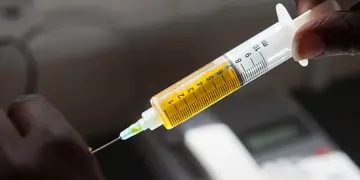Fears for patient care due to shortages of chronic alcohol misuse treatment Pabrinex
Fears for patient care due to shortages of chronic alcohol misuse treatment Pabrinex
Stocks of one of the most effective treatments for heavy drinkers have run out in some areas and doctors and charity bosses are warning that the most disenfranchised people in society will suffer
Doctors have warned shortages, and the cessation of production, of medicines used to prevent heavy drinkers from a ‘debilitating’ degenerative neurological condition will affect some of the most disenfranchised people in society – and care for patients in some areas is already ‘compromised’.
The manufacturers of Pabrinex, a high-potency blend of vitamins, which comes in IM (intramuscular) and IV (intravenous) forms, have announced the IM medication will be discontinued and supplies of the IV form are already running low and will not replenished until the second half of 2025 at the earliest. In the meantime, the Department of Health has told clinicians to review their use of Pabrinex to ensure it is only being offered where ‘clinically necessary’ and supplies of remaining products are being restricted.
Doctors and charity leaders across the country have raised concerns about the impact on patient care, with staff in some areas reporting stocks have already run out, and others receiving minimal or ‘unhelpful’ communication about the impending shortages of a drug which costs just £2 per treatment. Local areas have now been told to use unlicensed alternative products, with each responsible for assessing the ‘quality’ and ‘suitability’ of the medicines in lieu of central evaluations.
David Bremner is medical director of Turning Point, a charity which provides care and services to around 25 per cent of people being supported for drink problems in England. Dr Bremner, who is a consultant addiction psychiatrist, said the medicines shortages, which come alongside continuing issues with the detox drug chlordiazepoxide, reflect the lack of care and status given to this patient group, following years of austerity cuts.
‘This would never be tolerated in cancer treatments,’ states Dr Bremner.
‘We have two drugs which are the gold standard of treatment, and neither are [consistently] available any more. Can you imagine that being accepted elsewhere? This is a group that doesn’t have a voice.’
Pabrinex is a high-potency concentrate solution of vitamins, including vitamin B1 or thiamine. It is given to patients at risk of developing Wernicke-Korsakoff syndrome – a degenerative neurological condition caused by lack of thiamine, which occurs in people suffering from alcohol addiction or abuse. Heavy alcohol use lessens the body’s ability to absorb vitamins and problem drinkers are given high doses through injection. There are a number of unlicensed thiamine injection alternatives available, which are widely used around Europe but legislation would be required to license them.
Dementia risk
Scottish consultant addiction psychiatrist Iain Smith said: ‘I have a patient just now who was in a foreign country and didn’t get the thiamine they needed and may well [now] have a life-long disability.’
Dr Bremner added: ‘This is a very serious and debilitating dementia that happens in young people. People can live for 40 years in specialist care settings with multiple nurses trying to manage them all because of not getting a shot of vitamins.’
The IV form of the medication is used particularly in hospitals to treat complications of alcohol addiction or overuse. Scottish emergency medicine consultant David Chung said ‘not having it will be a problem’.
He added: ‘Seeing as alcohol-related admissions are about five to six times higher in more deprived populations you can see straight away who this will impact the most.’ Dr Chung said his hospital has enough supply to last until roughly Christmas this year.
GP Marcus Bicknell, who works at an inpatient detox unit in Nottingham, said his supplies of the ‘essential’ Pabrinex had run out last month: ‘It is the cheapest, most basic, most useful thing we give drinkers.’
He added: ‘Our care is being compromised right now. The patients who would have been getting five doses are not getting any from us and these are patients drinking two or three hundred units of vodka a week and at great risk.’
Dr Bremner sits on national groups with OHID (the Office for Health Improvement and Disparities) and said, in his view, national leaders have reacted quickly to the supply problems but has urged expedited action on legislation to license an alternative product which can be available across the country to all patients who could benefit.
He said he was confident his organisation would be able to provide an unlicensed alternative for patients in the meantime, but that these solutions are easier for a large organisation, and that barriers to care will be increased, regardless, owing to unlicensed alternatives needing to be prescribed and often requiring a named patient rather than being able to give the treatment instantly to anyone who presents.
Dr Bremner said: ‘I can put my lead pharmacist on this knowing she’s doing it for 15,000 people. If I’m a small GP practice running clinics on alternate Wednesdays, I don’t have the resource.’
Steve Willott, GP clinical lead for alcohol and drugs in Nottingham, said: ‘As soon as possible a sustainable solution is needed – getting injectable thiamine as a licensed option is crucial. This situation is a sticking plaster currently.’
Rob Hampton is a GP in Leicester who works in a private rehab facility. He said his organisation, even though Care Quality Commission-registered and in regular contact with NHS England, hadn’t been advised about the shortage and were informed by a local pharmacist. He said his facility would have to turn away patients at risk of developing neurological complications if the drug becomes unavailable. He said: ‘It could increase the burden on the NHS and reduce an avenue for people who can’t access treatment.’
Doctors and experts across the country told The Doctor a lack of profitability – combined with the effects of Brexit – were likely driving the issues.
Dr Bremner said: ‘The profit margins for these things are small. They are off patent now. The tragedy is if this was a very expensive drug, there would be an incentive to produce it.’
In an email to The Doctor, Andrew McKerracher, a vice president at Grunenthal Meds’, the pharmaceutical company responsible for Pabrinex, blamed changes in EU regulations for the issues. He said the firm had found a new manufacturing partner but that the process is ‘complex’ and stocks will not last the time needed to make the move. Mr McKerracher said the firm had discontinued the IM form after ‘extensive analysis’ of the timescales and complexity involved.
Treatment needed
Dr Bicknell said this was ‘a story of the ineptitude of medicine management in this country’ and described the relationship between NHS and Government health bosses and the pharmaceutical industry as being ‘clearly not fit for purpose’.
The Department of Health said it had no ‘powers to insist that a company continues to keep a product on the market’ and that it was working closely with NHS England, MHRA (the Medicines and Healthcare Products Regulatory Agency), the devolved governments and other stakeholders ‘to ensure patients have access to the treatments they need’. It said clinicians should ‘assess patients locally to decide on their best treatment option’.
The MHRA refused to answer questions about negotiations with the manufacturer and processes around unlicensed alternatives, citing ‘commercial confidentiality reasons’.






